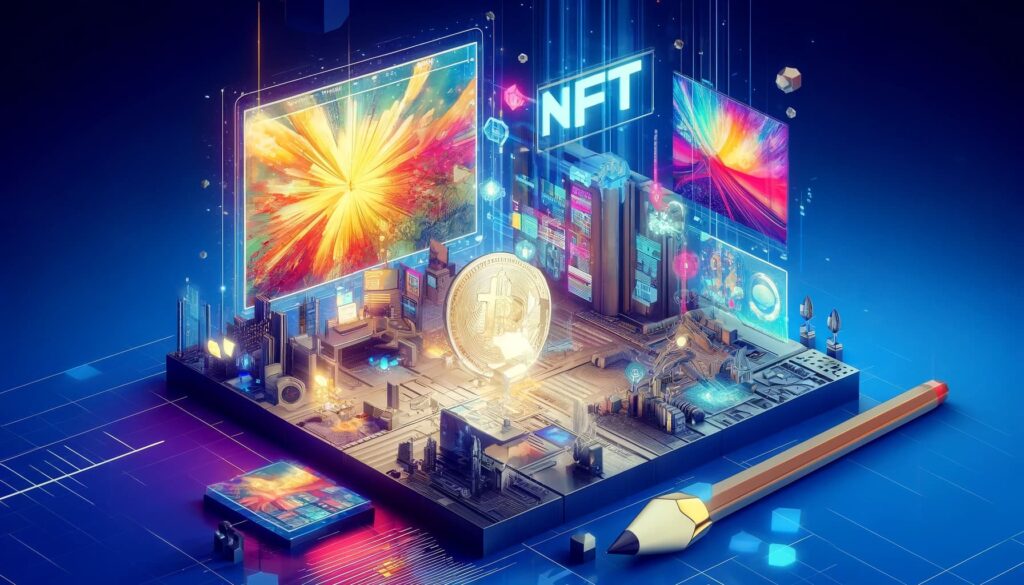Smart Contracts on Ethereum
Smart contracts on Ethereum are self-executing programs with the terms of the agreement directly written into code. They reside at specific addresses on the Ethereum blockchain and can manage assets, execute transactions, and support decentralized applications (dApps). To create a smart contract, you connect to the Ethereum network, choose a test network, fund your wallet with Testnet ETH, and write the contract using Solidity, Ethereum's programming language. Security is paramount; following best practices, such as keeping the code simple and preparing for unexpected scenarios, is essential. Understanding these fundamentals can help harness the full potential of Ethereum smart contracts.
Smart Contracts Defined
Smart contracts are digital agreements stored on a blockchain network that are automatically executed when predetermined terms and conditions are met. These agreements are created using computer code and contain a set of rules and provisions that outline the obligations of all parties involved. The purpose of smart contracts is to facilitate secure and trustworthy transactions without the need for intermediaries such as banks or lawyers.

The execution process of smart contracts is based on a decentralized network of computers, known as nodes, that validate and execute the code contained within the contract. Once the specified conditions outlined in the contract are met, the code is automatically executed, and the agreed-upon actions are carried out.
One of the main benefits of smart contracts is automation. By using pre-programmed code, smart contracts automate tasks that were traditionally performed manually. This automation not only saves time and reduces human error but also ensures that the terms of the contract are executed precisely as agreed upon.
Another significant advantage of smart contracts is their ability to eliminate the need for intermediaries. With smart contracts, there is no requirement for a middleman to enforce the terms and conditions or facilitate the transaction. This not only streamlines the process but also reduces costs.
Additionally, smart contracts provide immediate certainty of outcomes. Because they are executed automatically and cannot be tampered with, parties involved in a smart contract can have confidence in the outcome without the need to rely on trust or third-party verification.
Smart contracts are digital agreements stored on a blockchain network that automate tasks, eliminate the need for intermediaries, and provide immediate certainty of outcomes. They revolutionize the way agreements are made and executed, making transactions more efficient, secure, and cost-effective.
Explanation of smart contracts
Smart contracts are computer protocols that encode and execute predefined actions based on specific conditions. They were introduced by the Ethereum blockchain platform and have revolutionized the way agreements are made and executed.
The main purpose of smart contracts is to eliminate the need for intermediaries, such as middlemen or central authorities, in various types of transactions. By automatically executing transactions when certain conditions are met, smart contracts ensure trust, transparency, and efficiency. This automation eliminates the need for costly third parties, reduces the potential for human error, and speeds up the overall process.
In the real world, smart contracts have numerous applications. One popular example is in the field of finance, where smart contracts can be used to automate lending or insurance agreements. For instance, a smart contract could automatically transfer funds to a borrower once certain conditions, such as the borrower's credit score reaching a specified threshold, are met.
Smart contracts are also utilized in supply chain management, where they can automate and verify the transfer of goods and payments between different parties. Another prominent application of smart contracts is in the decentralized finance (DeFi) space, where platforms like decentralized exchanges use smart contracts to enable trustless and automated trading.
Smart contracts are a powerful tool that streamline processes, reduce costs, and enhance security and accountability in a wide range of real-world applications.
Importance in blockchain technology
Blockchain technology is of immense importance as it provides a secure and decentralized platform for transactions. The decentralized nature of blockchain eliminates the need for intermediaries, such as banks or governments, which often introduce vulnerabilities and delays into financial transactions. By utilizing a distributed ledger system, blockchain ensures security and transparency in transactions.
One of the crucial features of blockchain is mining, a process through which new transactions are added to the blockchain. Miners verify the legitimacy of transactions by solving complex mathematical algorithms, thus preventing the possibility of fraudulent activities. This mining process also enhances the security of transactions, as each block is linked to the previous one through a cryptographic hash, making it almost impossible to alter or tamper with the data.
Elliptic-curve cryptography further strengthens the security of blockchain transactions. This cryptographic method ensures that only authorized users have access to the transaction information. It prevents unauthorized parties from intercepting or altering the data during transmission.
Blockchain also relies on peer-to-peer networks, where multiple participants contribute to the validation and verification of transactions. This decentralized network eliminates the need for a central authority, making it resistant to censorship and providing a higher level of trust among participants.
Blockchain technology plays a vital role in providing a secure and decentralized platform for transactions. Features such as mining, hashing, elliptic-curve cryptography, and peer-to-peer networks contribute to the importance and promise of blockchain in enabling secure and transparent transactions.
Understanding Ethereum
Ethereum has been making waves in the world of cryptocurrencies with its groundbreaking technology and innovative features. In this article, we will delve into the depths of Ethereum to better understand its core principles, functionalities, and impact on the digital landscape. From its origins as a decentralized platform for building and executing smart contracts to its advanced blockchain technology, Ethereum has revolutionized the way we interact with digital assets. By exploring its unique features, such as the Ethereum Virtual Machine (EVM) and Ether, the native cryptocurrency of the platform, we hope to provide you with a comprehensive overview of how Ethereum operates and how it has shaped the future of decentralized finance, decentralized applications, and the broader blockchain ecosystem. So, join us as we embark on a journey to unlock the complexities of Ethereum and gain a deeper understanding of its immense potential and possibilities.
What is Ethereum?
Ethereum is a decentralized blockchain platform that enables the development of decentralized applications (dApps). Unlike traditional centralized systems, Ethereum operates on a distributed network of computers, ensuring transparency, security, and immutability.
At the core of Ethereum are smart contracts, which are self-executing agreements coded onto the blockchain. These smart contracts contain the rules and conditions under which the parties involved agree to operate, eliminating the need for intermediaries. They automatically execute when predetermined conditions are met, ensuring trust and efficiency in various industries such as finance, supply chain, and gaming.
Consensus algorithms are the mechanisms used by Ethereum to validate transactions and secure the network. Currently, Ethereum uses a proof-of-work (PoW) algorithm, where miners compete to solve complex mathematical puzzles to validate transactions and add them to the blockchain. However, Ethereum is transitioning to a proof-of-stake (PoS) algorithm, where validators are chosen based on the number of tokens they hold and their willingness to lock them up as collateral.
Cryptographic tokens, called Ether (ETH), are the native currency of the Ethereum platform. They are used for various purposes, such as compensating miners for validating transactions and executing smart contracts. Additionally, they can be used as a medium of exchange within decentralized applications and can also represent ownership or value in the digital world.
Decentralized applications, or dApps, are applications that run on the Ethereum platform. Traditional applications are centrally controlled, but dApps operate on the blockchain, allowing for greater transparency, security, and interoperability across different applications.
Ethereum is a decentralized blockchain platform that enables the development of applications through the use of smart contracts, consensus algorithms, cryptographic tokens, and decentralized applications (dApps). These components collectively create a trustless and transparent ecosystem, revolutionizing various industries and opening up new opportunities for innovation.
The Ethereum platform
The Ethereum platform is a decentralized blockchain network that facilitates the creation and execution of smart contracts. It offers various key features and components that make it unique.
One fundamental aspect of the Ethereum platform is Ethereum accounts. These accounts serve as digital wallets and are used to store and manage Ethereum's native cryptocurrency, Ether (ETH). Ethereum accounts can be divided into two categories: Externally Owned Accounts (EOA) and Contract Accounts.
Externally Owned Accounts (EOA) are controlled by private keys and are typically owned by individuals. These accounts allow users to hold and transfer Ether, as well as interact with smart contracts on the Ethereum platform. On the other hand, Contract Accounts are accounts that hold and execute smart contracts. These accounts do not have private keys associated with them and rely on externally owned accounts to interact with them.
In managing Ethereum account addresses, one widely used tool is Metamask. Metamask is a browser extension that enables users to access and interact with the Ethereum platform. It acts as a bridge between the user's browser and the Ethereum blockchain, providing a secure way to manage Ethereum account addresses, sign transactions, and interact with decentralized applications (dApps) seamlessly.
The Ethereum platform offers a robust framework for building decentralized applications and executing smart contracts. The combination of Ethereum accounts, including Externally Owned Accounts and Contract Accounts, along with tools like Metamask, empowers users to participate in the Ethereum ecosystem efficiently and securely.
Comparison to other blockchain platforms
When it comes to the world of blockchain platforms, there are plenty of options to choose from. Each platform offers its unique features and capabilities, making it essential to compare and understand the differences before making a decision. Comparing blockchain platforms involves evaluating factors such as scalability, security, transaction speed, governance models, and consensus protocols. Bitcoin, the pioneering blockchain platform, paved the way for others to follow.
However, newer platforms such as Ethereum, Ripple, and Hyperledger have emerged with distinct characteristics that set them apart. Ethereum stands out for its ability to execute smart contracts, while Ripple focuses on facilitating fast and low-cost international payments. Hyperledger, on the other hand, is recognized for its privacy and permissioned features, catering to enterprise requirements.
As blockchain technology continues to evolve, it becomes increasingly important for organizations and developers to carefully consider the strengths and weaknesses of each platform, ensuring they select the one that best suits their needs.
Role of Smart Contracts on Ethereum
Smart contracts play a pivotal role in the functioning of the Ethereum blockchain. They serve as self-executing digital agreements that automate contract execution, increasing efficiency and security in a decentralized manner.
By utilizing the Ethereum blockchain, smart contracts eliminate the need for intermediaries, such as lawyers or brokers. They are programmed to automatically execute the terms and conditions defined in the contract once certain pre-set conditions are met. This automation reduces the need for manual intervention, saving time, effort, and costs associated with traditional contract management.
Smart contracts also enhance efficiency by ensuring accurate and transparent transactions. The Ethereum blockchain's immutable nature guarantees that once a smart contract is deployed, it cannot be altered or tampered with. This prevents any manipulation or fraud, reducing risks and increasing trust between parties involved.
The use cases of smart contracts are varied across different industries. In finance, they enable secure peer-to-peer lending, automated insurance claims, and decentralized exchanges. Supply chain management benefits from smart contracts, enabling transparent and traceable transactions. Additionally, smart contracts find application in voting systems, real estate, intellectual property rights, and other domains that require secure, reliable, and automated agreement execution.
Smart contracts on the Ethereum blockchain automate contract execution, enhance efficiency and security, and find extensive use in various industries where trust, transparency, and accuracy are of utmost importance.
How smart contracts operate on the Ethereum network
Smart contracts are self-executing contracts with the terms of the agreement directly written into lines of code. These contracts operate on the Ethereum network, a decentralized platform that enables the creation and execution of smart contracts.
Smart contracts on the Ethereum network are primarily written in a programming language called Solidity. Once the smart contract is written, it is deployed on the Ethereum network and stored within the blockchain.
When predetermined conditions, defined within the contract's code, are met, the execution of the contract is automatically triggered. These conditions can include events such as a specific date or time, a specific external trigger, or the fulfillment of certain criteria.
Once triggered, the smart contract operates autonomously, executing the code as written. This ensures that the terms of the contract are met without requiring intermediaries or manual intervention. The decentralized nature of the Ethereum network ensures that the execution of the smart contract is transparent and immutable, as it is verified and recorded by multiple nodes within the network.
Smart contracts on the Ethereum network offer a secure, reliable, and efficient way to execute agreements as they eliminate the need for intermediaries and increase trust through code execution.
Benefits of using smart contracts on Ethereum
Smart contracts on the Ethereum blockchain offer numerous benefits that revolutionize traditional business processes. Firstly, these smart contracts reduce transaction costs significantly. With traditional contracts, intermediaries such as lawyers or notaries are often required, resulting in higher costs. However, smart contracts eliminate the need for intermediaries, leading to cost savings.
Additionally, smart contracts enhance efficiency by automating agreement terms. Once the conditions programmed into the contract are met, the contract executes automatically, reducing the time and effort required for manual verification and enforcement.
Moreover, smart contracts eliminate intermediaries altogether. This decentralization not only increases efficiency but also enhances security and transparency. Interactions are recorded on a decentralized ledger, ensuring that records are tamper-proof and transparent to all parties involved, reducing the risk of fraud.
The decentralized nature of smart contracts on Ethereum provides an added layer of security, as data is not stored in a central location that is vulnerable to hacks. This reduces the risk of unauthorized access and improves the integrity of transactions.
Furthermore, the use of smart contracts has given rise to a thriving market for decentralized finance (DeFi) applications on Ethereum. These applications enable users to access financial services without relying on traditional intermediaries, democratizing access to financial tools and services.
The benefits of using smart contracts on Ethereum are vast. They reduce transaction costs, increase efficiency, eliminate intermediaries, enforce agreement terms automatically, enhance security and transparency, eliminate fraud risks with a decentralized ledger, and are the driving force behind the expanding market for DeFi applications.
Technical Aspects of Smart Contracts
Smart contracts have emerged as a groundbreaking technology in the world of blockchain and cryptocurrency. These self-executing contracts eliminate the need for intermediaries and enable secure, transparent, and efficient transactions. However, to fully understand the potential of smart contracts, it is essential to explore their technical aspects. From the underlying programming languages and their potential vulnerabilities to the role of consensus mechanisms, this section will delve into the intricacies of smart contract technology. Additionally, we will also examine the scalability and interoperability challenges faced by smart contracts and discuss potential solutions. By examining these technical aspects, we can gain a comprehensive understanding of the inner workings of smart contracts and their transformative potential in various industries.
Smart Contract Code
Smart contracts are self-executing digital contracts that are stored and maintained on a blockchain. They contain a set of rules and conditions that automatically execute and enforce the terms of an agreement between multiple parties. Writing smart contract code involves defining these rules and conditions in a programming language, such as Solidity, and deploying the code on a blockchain platform like Ethereum.
The first step in writing smart contract code is to determine the requirements and logic of the agreement to be executed. This includes identifying the involved parties, the conditions for triggering actions, and the desired outcomes. Once the requirements are clear, the code can be developed using a suitable programming language and integrated development environment (IDE). This involves defining functions, variables, and events, as well as the conditional statements and calculations necessary to execute the contract.
One of the key advantages of using a blockchain, like Ethereum, for writing smart contract code is immutability. Once deployed on the blockchain, the code cannot be altered or tampered with, ensuring the transparency and integrity of the contract. Additionally, blockchain platforms typically provide built-in mechanisms for verifying and validating the execution of smart contract code, reducing the need for intermediaries and enhancing security. Furthermore, the decentralized nature of a blockchain allows for the seamless execution of smart contracts without the need for trust in a centralized authority.
Writing smart contract code involves defining the rules and conditions of an agreement in a programming language, such as Solidity, and deploying it on a blockchain platform like Ethereum. The advantages of using a blockchain include immutability, transparency, enhanced security, and the ability to execute contracts in a decentralized manner.
Description of smart contract code structure
Smart contract code is a piece of code written in a programming language, which is used to create and execute smart contracts on a blockchain platform, such as Ethereum. A smart contract code has a specific structure and includes various components.
The smart contract code structure consists of the following components:
1. Contract Declaration: A smart contract code begins with the declaration of the contract. It specifies the name of the contract and its visibility (public, private, etc.).
2. State Variables: State variables are used to store and manage the state of the contract. They preserve their value throughout the execution of the smart contract. These variables include data types like integers, addresses, strings, etc.
3. Constructor Function: A constructor function is optional and is called only once when the contract is deployed. It is used to initialize the state variables of the contract.
4. Functions: Functions in a smart contract code define the behavior and capabilities of the contract. They can be public or private, and specify the input and output parameters. Functions can be used to manipulate the state variables, interact with other contracts, and perform various computations.
5. Events: Events are used in a smart contract code to notify external applications about specific occurrences in the contract. They provide a way to communicate and retrieve information from the contract.
6. Modifiers: Modifiers in a smart contract code are used to modify the behavior of functions. They are applied before the execution of a function and allow for pre and post-condition checks.
Smart contract code is structured in a way that allows for the creation of decentralized applications on a blockchain platform, ensuring transparency, immutability, and trustlessness.
Examples of smart contract code
Smart contract code is a revolutionary concept that has gained significant attention in recent years. It refers to computer programs built on blockchain platforms that automatically execute and enforce the terms of a contract without requiring intermediaries or third parties. Smart contracts provide a decentralized and transparent way to ensure that agreements are fulfilled. The following examples showcase the diverse applications and functionalities of smart contract code, demonstrating its vast potential across a wide range of industries. Whether it is enabling secure financial transactions, managing supply chains, or facilitating the creation and exchange of digital assets, smart contract code is shaping the future of contractual relationships.
1. Financial Transactions:
Smart contract code has transformed the finance industry by simplifying and automating complex financial transactions. For instance, a smart contract can be programmed to execute a payment automatically when certain predefined conditions are met, eliminating the need for intermediaries such as banks or escrow services. This streamlines the process, reduces costs, and enhances efficiency. Furthermore, smart contract code enables the development of decentralized lending platforms, peer-to-peer lending, and decentralized exchanges, facilitating secure and transparent financial services.
2. Supply Chain Management:
Another compelling application of smart contract code is in supply chain management. By utilizing blockchain technology, smart contracts can enhance transparency, traceability, and accountability in supply chains. For example, a smart contract can track the movement of goods from their origin to the end consumer, recording every transaction and verifying the authenticity and quality of products. This level of transparency helps eliminate counterfeiting, improves trust among stakeholders, and streamlines logistics, ensuring a more efficient and secure supply chain.
3. Digital Assets and Intellectual Property:
Smart contract code has revolutionized the creation, ownership, and distribution of digital assets and intellectual property. By leveraging blockchain technology, smart contracts enable the creation of non-fungible tokens (NFTs), which represent unique digital assets such as art, music, collectibles, and virtual real estate. These tokens are governed by smart contracts, embedding certain rules and conditions, ensuring authenticity, preventing unauthorized duplication, and providing creators with a means of monetizing their work directly. This opens up new avenues for artists, content creators, and innovators to protect and monetize their creations in a decentralized and secure manner.
Smart contract code is transforming various industries by revolutionizing financial transactions, improving supply chain management, and revolutionizing the creation and distribution of digital assets. As blockchain technology continues to evolve, smart contract code will play an increasingly vital role in reshaping the way we engage in contractual relationships and conduct business.
Programming Language for Smart Contracts
Smart contracts are computer programs or transaction protocols that automate and execute actions based on specific conditions. These codes are run on blockchains, which are decentralized and distributed ledgers. Smart contracts eliminate the need for intermediaries, reducing costs and the potential for fraud.
There are several programming language options available for writing smart contracts. Solidity is the most popular language for creating smart contracts on Ethereum, the largest blockchain platform. It is specifically designed for writing secure and efficient code for smart contracts. Solidity supports features such as contract inheritance, libraries, and function modifiers, making it versatile for contract development.
Another widely used language for smart contracts is Vyper. Like Solidity, Vyper is designed for Ethereum smart contracts and emphasizes security. It has a simpler syntax compared to Solidity, making it easier to write secure code but with fewer features.
Other blockchain platforms also offer their own programming languages for smart contract development. For example, Chaincode is the language used for writing smart contracts on the Hyperledger Fabric blockchain. Chaincode is based on the widely used programming language Go, making it more accessible for developers familiar with Go.
Programming languages for writing smart contracts are essential tools that enable the automation and execution of actions on blockchain platforms. By eliminating intermediaries, these contracts reduce costs and the potential for fraudulent activities, increasing trust and security in digital transactions.


